The product recommendations in this post are recommendations by the writer and/or expert(s)
interviewed and do not contain affiliate links. Meaning: If you use these links to buy
something, we will not earn a commission.
Canned or shelf-stable soups in jars or boxes are easy to heat and eat, but not all choices are healthy. Over the past decade or so, many soup companies have come out with better-for-you lines and have reduced sodium amounts. However, there are still options that shouldn’t be part of your everyday diet.
A few things to look for when selecting a healthy canned soup are the serving size, calories, saturated fat, and sodium:
- Serving size: The serving size is sometimes one can and sometimes a cup, so compare the volume you’re getting.
- Calories: The calories can range from about 100 to 250 calories but look what you’re getting for those calories. If you’re getting whole grains, protein, and veggies for those calories, then that is a good use of the calories. However, if those calories are filled with creamy saturated fat calories or high-fat meats, it’s probably not the best choice.
- Saturated fat: Saturated fat intake has been linked with an increased risk for heart disease—the creamier soups tend to have very high amounts and should be an indulgence versus a daily or weekly food on your menu.
- Sodium: As for sodium, food companies have lowered the amounts over the years, but some are just way too high.
Below you’ll find 6 of the best soups to buy and 6 of the worst soups to minimize consumption of. When buying soups it’s important to weigh the nutrients and where the calories are coming from in order to make the best choice for you. Read on, and for more, don’t miss 12 Best & Worst Frozen Foods to Buy at Costco, According to Dietitians.
6 Best Canned Soups
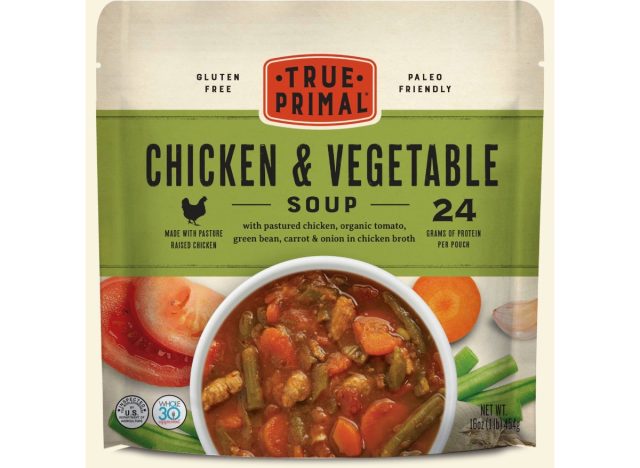

Per 1 pouch (454 g): 240 calories, 8 g fat (2 g saturated fat), 880 mg sodium, 17 g carbs (5 g fiber, 8 g sugar), 24 g protein
“Packed with 24 grams of protein per pouch, this soup is made with quality ingredients like chicken, veggies, and beef gelatin (a rich source of the amino acid glycine,” explains Lauren Manaker MS, RDN, LD registered dietitian, author of Fueling Male Fertility. “This soup is gluten-free, paleo-friendly, and totally delicious.”
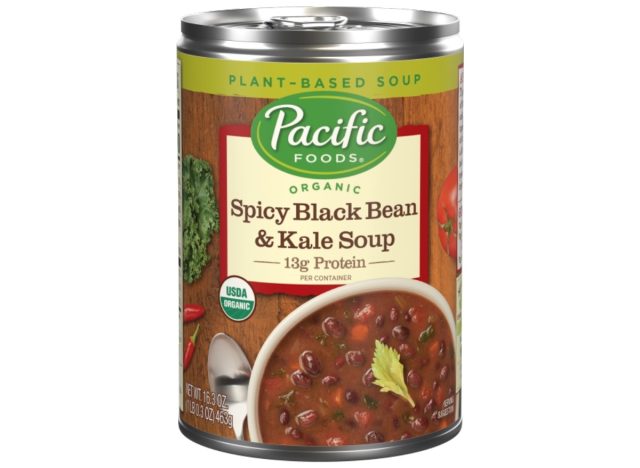

Per 1 cup: 150 calories, 1 g fat (0 g saturated fat), 550 mg sodium, 29 g carbs (6 g fiber, 3 g sugar), 7 g protein
This plant-based vegan soup is made with simple ingredients including black beans and kale flavored with chili powder to give it a kick. It provides a whopping 21% of the daily recommended amount of fiber and is rather reasonable on the sodium compared to other brand options. Serve as a warming appetizer to a meal or pair with a salad or sandwich.
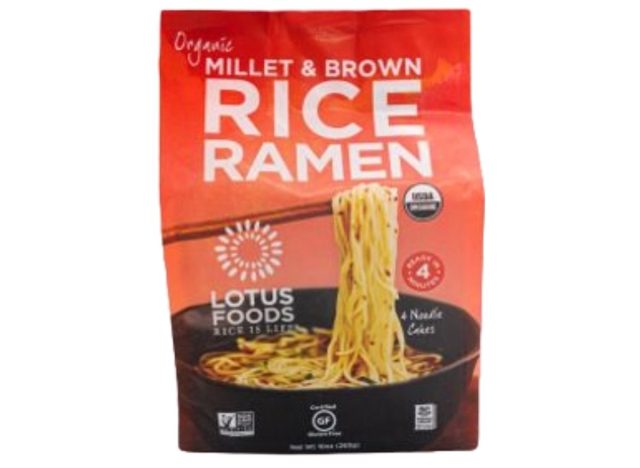

Per ½ piece (35 g): 120 calories, 1.5 g fat (0 g saturated fat), 0 mg sodium, 23 g carbs (2 g fiber, 0 g sugar), 4 g protein
“Many ramen soups, while delish, are packed with sodium and are loaded with refined carbs,” says Manaker. “Lotus Foods makes a ramen that contains 4 grams of fiber and a whopping 9 grams of protein.” Plus, Manaker points out that this delicious soup is dairy-free, gluten-free, and vegan-friendly, which means it can fit into many diets.
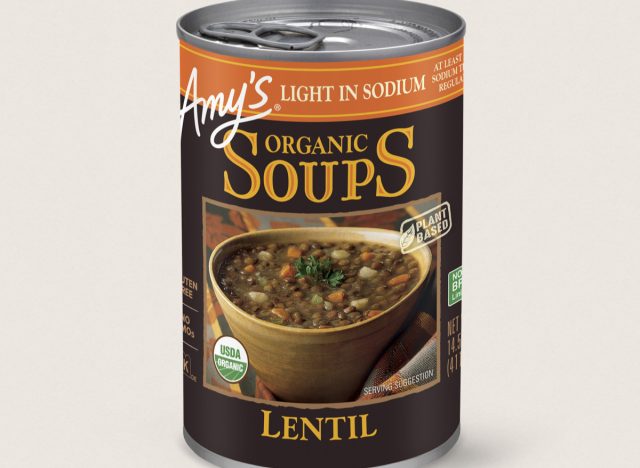

Per 1 can (411 g): 300 calories, 10 g fat (1.5 g saturated fat), 450 mg sodium, 40 g carbs (7 g fiber, 5 g sugar), 12 g protein
“Amy’s Organic Lentil Soup is a healthy option because it is made with organic ingredients, is low in sodium, and is high in protein and fiber,” says Wan Na Chun, MPH, RD, CPT of One Pot Wellness. With 12 grams of protein and 7 grams of fiber, Chun says this soup makes a filling and nutritious meal option when paired with a side of vegetables or an additional protein source.
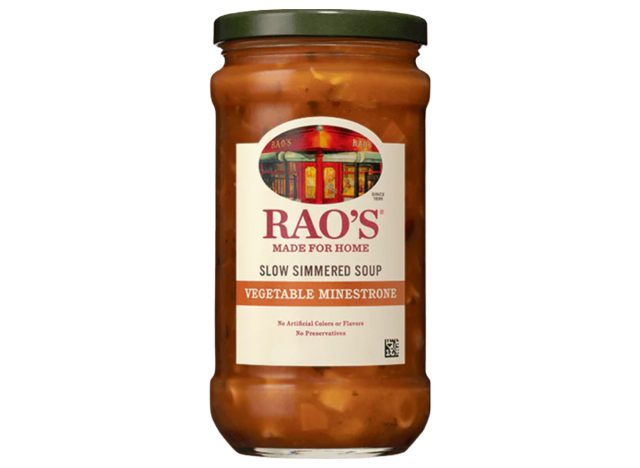

Per 1 jar (454 g): 100 calories, 0.5 g fat (0 g saturated fat), 670 mg sodium, 20 g carbs (3 g fiber, 4 g sugar), 3 g protein
Made with Italian peeled tomatoes, vegetables, and enriched pasta, this warming bowl of soup is a better-for-you option with only 100 calories, 11% the daily recommended fiber, and is saturated fat-free. Rao’s soups are packed in shelf-stable jars, so you can store them in your pantry for quite some time.
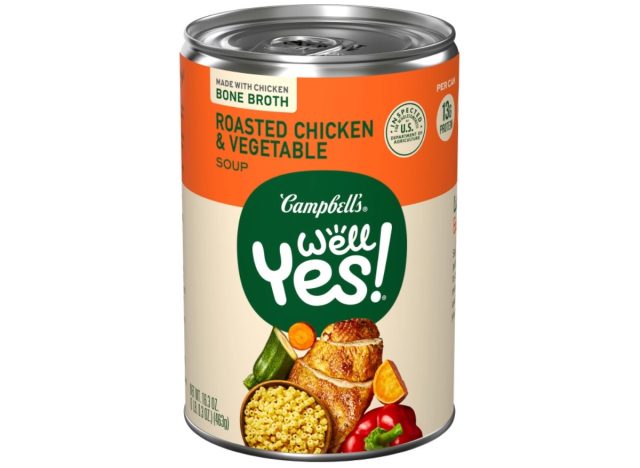

Per 1 cup: 90 calories, 1 g fat 0( g saturated fat), 640 mg sodium, 14 g carbs (1 g fiber, 2 g sugar), 7 g protein
READ RELATED: Horse Gram: Discover The Benefits Of This Superfood
Well Yes! soups are made with carefully selected and sourced ingredients like chicken meat with no antibiotics. The soups contain no artificial colors, flavors, ingredients or modified starches. The Roasted Chicken and Vegetable Soup is made with chicken carrots, sweet potatoes, pasta, corn, red peppers, and roasted garlic. It provides a reasonable amount of calories, 7 grams of protein, and is saturated fat-free per each 1 cup serving. It’s a delicious way to up your veggies as an appetizer to a meal or paired with a salad or sandwich.
6 Worst Canned Soups
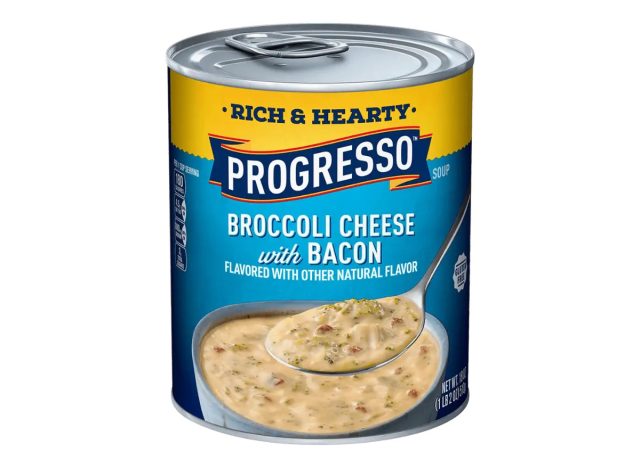

Per 1 cup (245 g): 170 calories, 12 g fat (4.5 g saturated fat), 800mg sodium, 10 g carbs (1 g fiber, 2 g sugar), 5 g protein
Progresso Rich & Hearty Broccoli Cheese with Bacon is just too rich in ingredients that push the saturated fat too high. Per each cup, you’ll get 22% of your recommended daily amount of artery-clogging saturated fat—much of it coming from the cheese and bacon. Sodium is also on the higher end at 35% of your daily recommended max. If you’re in the mood for a cheesy soup like this, you can find better-for-you recipes so you can better control the ingredients and take some time to make your own.
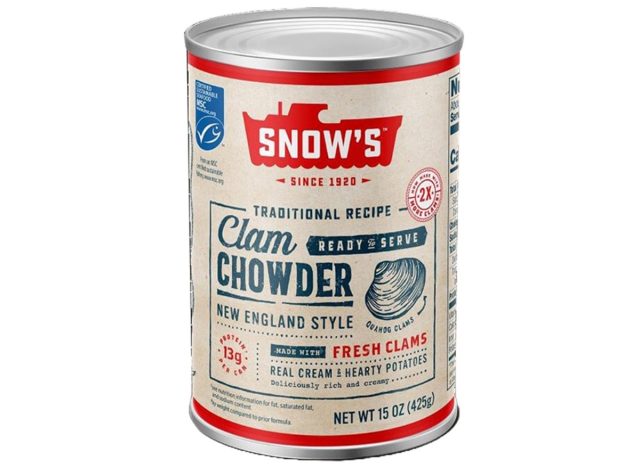

Per serving (1/2 can): 205 calories, 13.5 g fat (3.5 g saturated fat), 755 mg sodium, 15 g carbs (0.5 g fiber, 2 g sugar), 6.5 g protein
This creamy New England-style clam chowder is rather high in calories per serving. It also provides 17% of the recommended daily max of saturated fat and 33% of the recommended daily amount of sodium. If you’re craving this soup, enjoy it once in a while but it shouldn’t be a daily menu item.


Per 1 can (425 g): 240 calories, 7 g fat (1.5 g saturated fat), 1,030 mg sodium, 30 g carbs (7 g fiber, 7 g sugar), 14 g protein
If you’re looking for 100% plant-based or vegan choices, here’s an example of why you should check the label before buying. The calories per serving for this plant-based soup is rather high for a soup compared to many other choices and the sodium is 45% the recommended daily amount and one of the highest around.
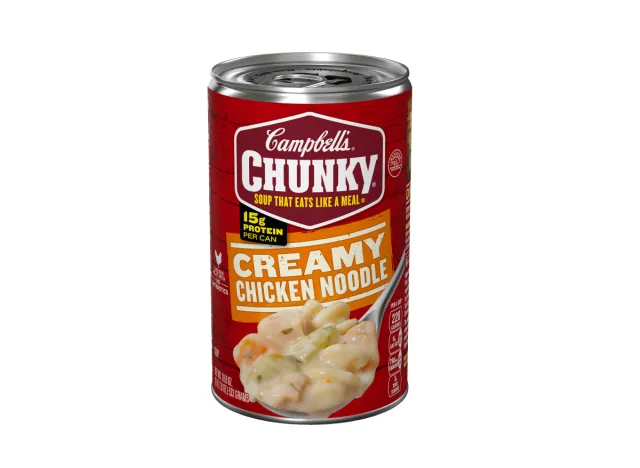

Per 1 cup (240 mL): 210 calories, 13 g fat (6 g saturated fat), 790 mg sodium, 17 g carbs (1 g fiber, 3 g sugar), 7 g protein
According to Chun, this soup “is a poor choice because it is high in calories, fat, and sodium, and contains many artificial ingredients. One serving of this soup contains 790 milligrams of sodium, which is over one-third of the recommended daily intake. “Consuming too much sodium can increase the risk of heart disease, as it can lead to high blood pressure and other risk factors,” explains Chun. When choosing canned soups, Chun recommends looking for options that are low in sodium and free from artificial additives and preservatives.
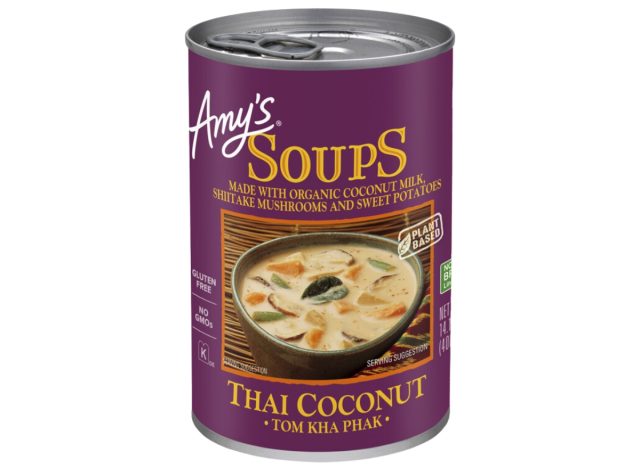

Per serving (about 2/3 of can): 210 calories, 14 g fat (11 g saturated fat),790 mg sodium, 15 g carbs (2 g fiber, 6 g sugar), 5 g protein
Amy’s has a ton of good-for-you soups, but this coconut-based soup is just too high in calories and saturated fat to be eaten often. Calories per serving is on the higher end and the saturated fat is 55% of the daily recommended max. The 2020-2025 Dietary Guidelines identifies coconut as a saturated fat and recommends limiting consumption of all saturated to no more than 10% of total daily calories. If you choose this soup, make it a once-in-a-while indulgence and opt for most any other Amy’s soup instead.
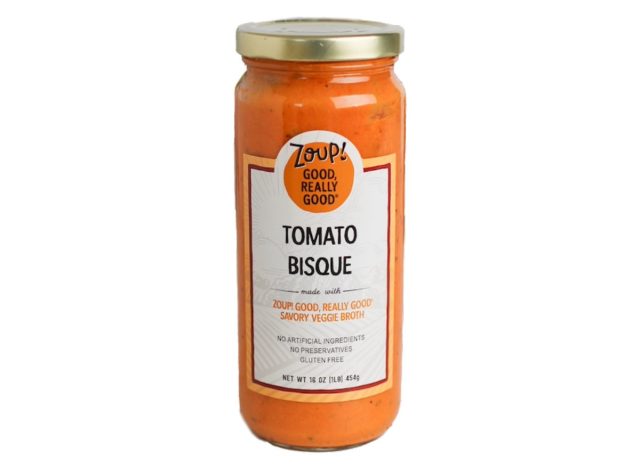

Per 1 cup: 270 calories, 23 g fat (14 g saturated fat), 230 mg sodium, 13 g carbs (1 g fiber, 9 g sugar), 3 g protein
Zoup makes a variety of healthy options, but the bisque made with cream just isn’t your best choice. The calories per cup are high and the saturated fat is 68% your recommended daily max. If you’re trying to watch your calorie intake or are at risk of having high cholesterol or heart disease, opt for many of the other healthier options by this brand.










